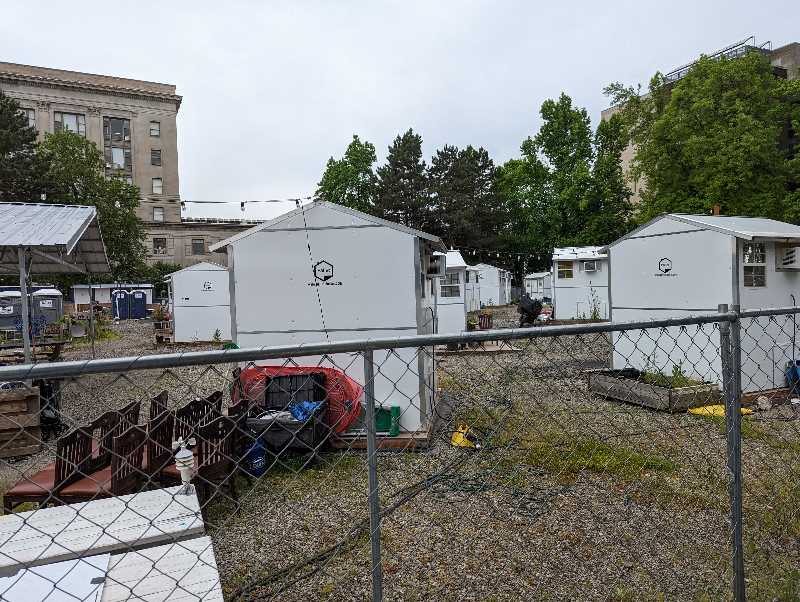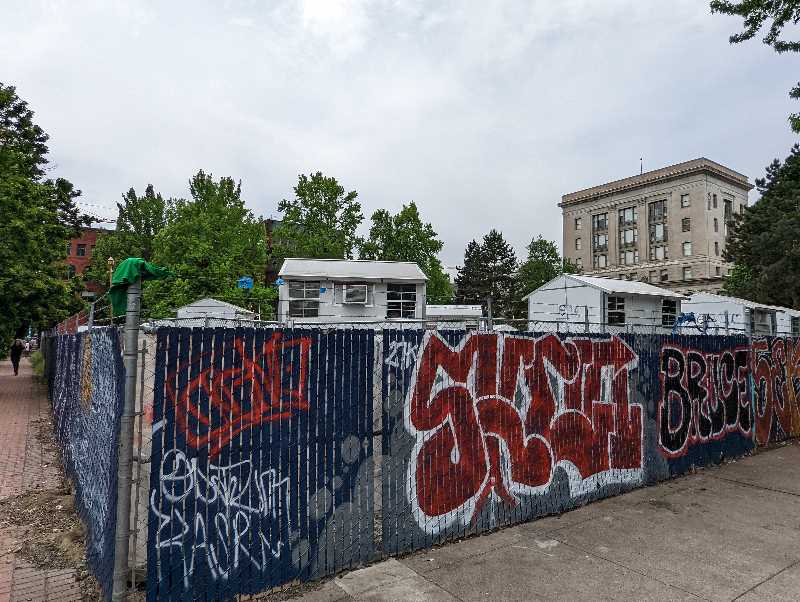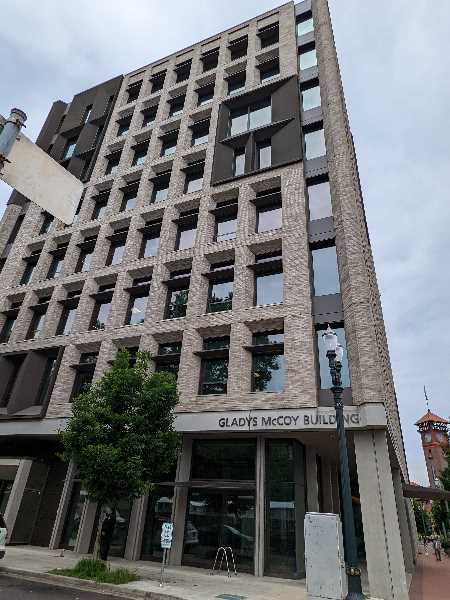The Portland Tribune is a KOIN 6 News media partner.
PORTLAND, Ore. (PORTLAND TRIBUNE) — The tiny home village for unhoused people at Northwest Hoyt Street and Broadway is closing down because the neighborhood is too violent.
Andy Goebel, executive director at All Good Northwest — which took over running the camp for Multnomah County on Oct. 1, 2021 — says gunfire in the streets around the camp is the main reason his nonprofit is quitting.
“We’re closing because of safety downtown,” Goebel told the Portland Tribune in early June. “We informed the Joint Office of Homeless Services that we would no longer be able to provide services in that location anymore. The Joint Office could not find another vendor to provide those services in that space, and therefore made the decision to decommission the village.”
Goebel said the threat was “100% outside the fence” and the problems were not caused by village residents. “We’d hear gunshots daily or nightly there for a spell.”
He said the residents had not been targeted, but there was one drive-by shooting where stray bullets went through the fence and into the camp.

“There were two clips of automatic gunfire where, thankfully, no one was hit,” he said.
However, staff were having to be first responders to people shot in the streets around the village, and in the end Goebel and his staff deemed it too dangerous for his staff and the residents to keep it going.
Goebel said a staff member mistakenly told Willamette Week that 18 village members were transferring to the new Multnomah Safe Rest Village in Multnomah Village, which has 30 units.
“We don’t know that yet. Now we’re having to counter that narrative. I haven’t looked at it,” Goebel said.
The camp will be vacated in late June. The city of Portland’s economic development group, Prosper Portland, owns the lot, but the tiny homes are owned by Multnomah County. The bathrooms are rented. The homes will be stored and reused at one of the six other, new, safe rest villages slated to open during the term of City Commissioner Dan Ryan, who championed the safe rest villages.

Other camps
As part of its Joint Office of Homeless Services contract, All Good NW manages the BIPOC and Queer Affinity safe rest villages. He said these two are not threatened by gunfire, so the problem is definitely the Old Town location.
“It was exclusively where it’s located, because the other villages are incredibly successful. And in our time doing this work with these three villages, we’ve been able to house 42 individuals, and we only have been doing it since October,” he said.
All Good NW is set to manage the new village at the former Jerome Sears Armory building in Multnomah Village when it opens on June 9. It also runs the traditional congregate shelter in close-in Southeast, a large space with shelter beds, cots or bunk beds, called the Market Street shelter.
Before the recent spring sweeps that cleared tents from around the former Greyhound bus station and along Northwest Broadway, the block had been one of the most active homeless camps in Old Town. Men fixed cars and vans in the street, drugs were dealt and consumed openly, and people in mental health crises acted out right in front of the new Gladys McCoy Multnomah County Health Services Center at 619 N.W. Sixth Avenue, which serves many people on Medicare and Medicaid. The site was further complicated by the overflow from the nearby affordable housing center Bud Clark Commons, where non-residents line up every day for services or camp on the sidewalk.
“We’re a low-barrier shelter,” Goebel said of the Old Town village. “We have people who experience severe and persistent mental illness. We have people who are actively participating in an addiction and that’s why we employ behavioral health specialists at each site.”
One door closes; another door opens
All of the Old Town villagers have been offered a new space to live, he says. They filled out a survey about where they wanted to go.
“We’ve been able to work with community partners from other agencies who run motels and other kinds of shelter, and been able to place folks in housing,” he said. “This spurred some folks to say, ‘Hey, let’s take those steps now.'”
Goebel said some people in the Old Town village have gone straight onto affordable housing apartments because their navigation specialists “just jumped on it and they got people on lists. They were like ‘All right, we’ve got this opportunity, we have this relationship so let’s go. Let’s get people in.'”
Safe rest villages are designed to be a respite from life in tents and doorways. According to All Good NW, they offer unhoused people “supports to achieve permanent housing, case management and social service support to address the trauma of houselessness, treatment for unmet mental health needs, substance use disorders, and prepare villagers to achieve their personal goals.”
Goebel explained that someone living outside, who gets on multiple housing lists, might stay on them for years because they can’t advocate for themselves and deal with the paperwork. Whereas a navigation specialist can do that work for them, and seize a chance when a motel room or apartment comes up.
Bidders
Multnomah County typically puts out a request for proposals to find a group like All Good NW that can run a village or another type of shelter. They then find contractors to provide things like food, sanitation and mental health care for the villagers. Goebel said Multnomah County couldn’t find anyone to take on the Old Town camp, but quitting hasn’t hurt All Good NW.

“I know that our services are being sought,” he said. “We’ve been incredibly successful at helping people in a short amount of time. We’ve proven our merit, even under less-than-ideal circumstances.”
Goebel said, when new villagers arrive, they get a day to settle in. “But right away, we want to set up case management and housing services, because that’s what we’re there to do. And participants don’t want to be in shelter, they want to be on their own.”
Asked how many more villages Portland would need to solve its homeless crisis, Goebel said “It depends on the nature of the service provision at those villages. If it’s an alternative shelter space with a robust staffing schema, then you could you do a lot.”
Denis Theriault, spokesman for the city-county Joint Office of Homeless Services, which awards the funds, said the lost beds will be absorbed in a larger expansion. “There’s a huge shelter expansion underway right now, countywide,” Theriault said. “This is a setback in this one area, but there’s a lot of other shelters going to be opening over the next year. The adult shelter bed number in the (coming) Joint Office budget was 2,418 beds at full capacity, not including full-time village.”
He said the nearby indoor shelters were better protected from gunfire.
Theriault added, “It wasn’t the camping around it that made it go away. It was the fentanyl trade and the gun violence. I don’t know what it’s like in the middle of the night now. Old Town was known as a drug market well before we saw the level of tents the last couple of years.”
